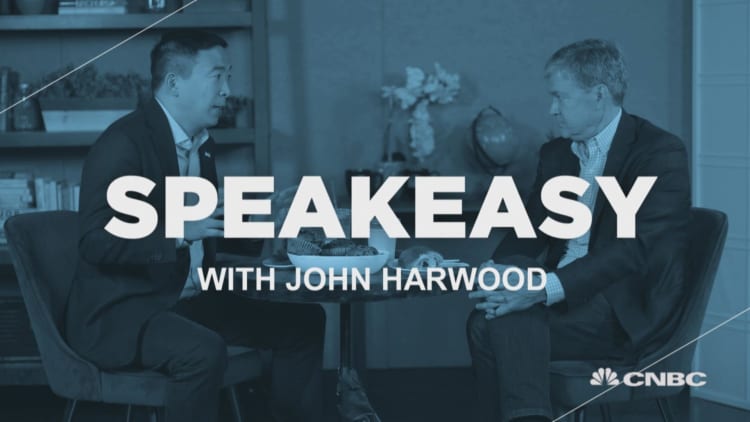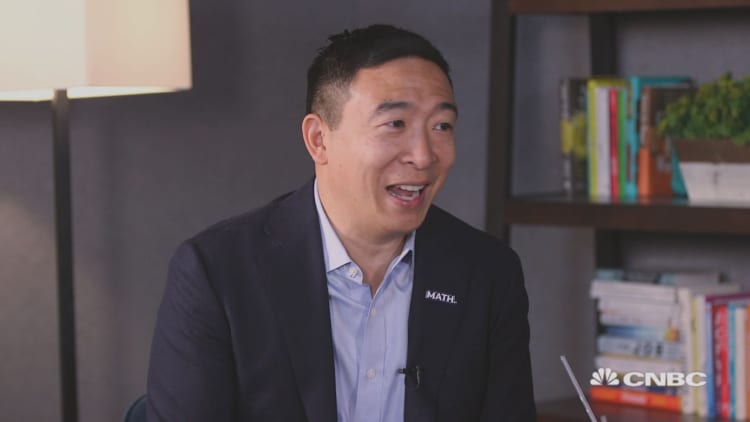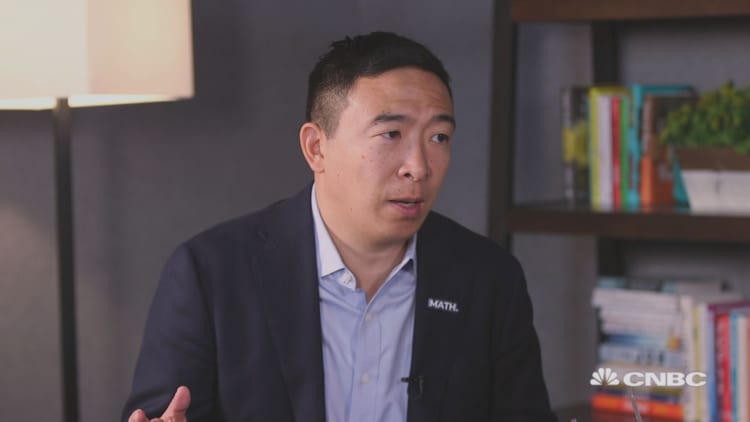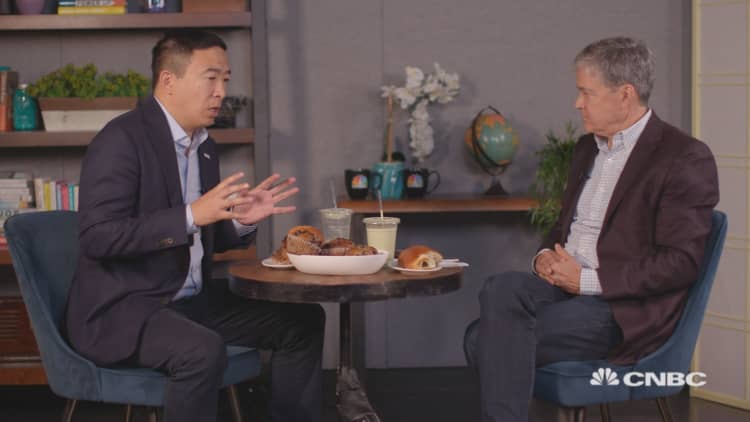
The race for the 2020 Democratic presidential nomination has a long way to go, but it already has at least one winner. That's Andrew Yang, and it's not because he will end up as his party's candidate.
Yang, an affable 44-year-old who eschews neckties and traditional rhetoric, trails front-running candidates Joe Biden, Elizabeth Warren and Bernie Sanders by a wide margin. But he has demonstrated sufficient appeal to outpace governors, senators and House members to grab and hold his place on Democratic debate stages.
A former lawyer who became wealthy as an entrepreneur, Yang entered the race without familiar presidential credentials. He had spent recent years boosting business start-ups through Venture for America, a nonprofit he founded.
Yang has built his campaign around what he calls The Freedom Dividend — a $1,000 per month "universal basic income" intended to cushion the impact of technological advances that have begun to supplant large swaths of the American workforce. Americans of every income level would receive it, with the enormous cost financed by a value-added tax under which the bottom 94% of earners would come out ahead.
Over bubble tea in Manhattan, Yang sat down with editor-at-large John Harwood to discuss his campaign. What follows is a condensed, edited transcript of their conversation.
John Harwood: You look like you're having fun in this race.
Andrew Yang: Yeah, I have been. Having a blast. It's been tremendous meeting thousands of Americans around the country. And if the upstart candidate who's overachieving and shocking the world can't have fun, who can?
John Harwood: One of the things that's appealing about you as a candidate is that you seem pretty normal.
Andrew Yang: Oh, thank you.
John Harwood: You're doing something that's very abnormal, running for president. Of all the ways you can serve and were serving through the Venture for America that you started, why did you pick this one, running for president, running for a job that by most conventional measures you're not really ready for?
Andrew Yang: Well, I spent seven years helping train hundreds of entrepreneurs and helping to create thousands of jobs around the country with this nonprofit that I founded, Venture for America. And I started that organization because I felt like our country was heading in the wrong direction in terms of its energies and the way our economy looked. And when Donald Trump got elected in 2016, I took that as a red flag that it was getting even worse, faster than I thought. And when I dug into the numbers, I was shocked to see that we'd automated away millions of manufacturing jobs in the swing states that Trump won. And then, now, we're closing 30% of stores in malls, and being a retail clerk's the most common job in the economy. My friends in California are working on cars and trucks that can drive themselves, and driving a truck is the most common job in 29 states. So when you see this playing out and you see our country is confused about it, our country's blaming immigrants for something that immigrants have next to nothing to do with, and then you game out how you can get meaningful solutions across the finish line in a reasonable time frame, let's call it five to 10 years, then the range of options becomes very, very limited very, very quickly. And I'd run a successful national nonprofit, and I saw what we can and can't do with that scale.
John Harwood: Do you think it's that bleak?
Andrew Yang: I do. The market is going to zero out more and more of us over time. And we can pretend that it's still like, "Oh, as long as I work hard and play by the rules everything is going to be fine." But one of the examples I use is, look, the robot truck doesn't care if you're a good conscientious truck driver or a sloppy, terrible one. It's all the same. You know, the technology doesn't care if you are really diligent radiologist or like a not so diligent one. We can still just read the film better with software. So we have to try and evolve as quickly as possible. There's a lot to be done.
John Harwood: When you think about what you see happening and the elimination of opportunity on a pretty gigantic scale, is that capitalism's fault or is it the particular intersection of capitalism and 21st century technology?
Andrew Yang: I like to quote my friend Eric Weinstein who said, "We never knew that capitalism was going to get eaten by its son, technology." And the fact is capitalism is not designed to optimize our well-being. It's designed to optimize for capital efficiency. And so if technology comes along that can do work cheaper and better than we can, then capitalism loves it. In the old days, we made all of these assumptions that what was good for capital ended up being good for us. Because if you had a big successful company, it would hire lots of workers, it would treat them well, it would care about what's happening in its home city. And now, in the 21st century, those things aren't true anymore. I can start a big successful company, not hire a lot of people. If I do hire them, I can make them all temp and gig contract workers and Uber drivers and not give them benefits, and I don't care about what happens in my backyard because I'm selling to everyone. And so the fundamentals that we assume to be true about capitalism are now breaking down, and technology is the accelerant.

John Harwood: You are a capitalist. But as you see modern capitalism, is it immoral in the way it functions right now?
Andrew Yang: It is doing what it's designed to do. You would consider it moral if you cared more about capital than human beings. I'd suggest you'd have to be fairly demented to go to this money pile and say, "Yes, we're serving you, money pile." And then to people be like, "Ah," we can ignore them.
John Harwood: Where does it fit in the moral equation that the modern version of capitalism has dramatically reduced global poverty?
Andrew Yang: As you suggested, I'm a capitalist. I'm a fan, you know? There's nothing more powerful than markets at optimizing where we put resources, and that includes people as well as capital. At the same time, you're going to see these global capital flows also change as advanced technology comes on online. And you're seeing not just the mechanization of American work but you're now starting to see it applied in other parts of the world. So this is an American problem but it's also a global problem. It's a human problem.
John Harwood: Some of your opponents in the race have cast this as a human problem, particular humans, Wall Street humans, CEOs, and that their decisions to embrace maximization of their own wealth and influence and power, greed, as Bernie Sanders talks about, is a big part of the problem. Do you agree with that?
Andrew Yang: Well, I think that we've gone overboard in financializing our economy. It's become the tail wagging the dog. And I think that Wall Street has been very effective at accelerating that financialization. At the same time, we have the incentives that we have. And so to the extent that we need to turn it around, we need to change everyone's incentives.
John Harwood: You're not faulting major figures on Wall Street for behaving badly?
Andrew Yang: There were excesses to be sure, and financial crisis is something that I think the country is still recovering from. The financial crisis actually had me start Venture for America in response, because I saw that literally my friends were creating financial instruments that had tanked the economy. To me, the vision that if we just scrape profits back from Wall Street, all will be well, to me does not take into account the magnitude of the economic transformation that we're in the midst of.
John Harwood: You have a particular appeal to young people. What would you tell them about why capitalism, and not socialism?
Andrew Yang: What I would say to them is, "I get it" — that if you come of age in this era and you just see this distorted version of capitalism, this inhuman version of capitalism, you would think, "Give me anything that's the opposite of this." And so they're being very rational and sensible. What we can do, ideally, is channel the energies of capitalism towards our own well-being, towards our own health and life expectancy, our mental health and freedom from substance abuse, how clean our air and water are, how our kids are doing. And then if we had different measurements, aside from stock market prices and GDP, then we could take the best of capitalism and turn it towards things that we can all get excited about. So that's the vision of what I call human capitalism that I would pitch to young people.
John Harwood: You get it. But you would say clearly and affirmatively that democratic socialism, as enunciated by somebody like Bernie Sanders or AOC, is just flat wrong — the wrong model?
Andrew Yang: Well, I think we need a positive economic vision that people can get excited about. I do not think pure socialism is that vision. But at this point, I also think that you need to take the best of any camp to solve the problems of this era.
John Harwood: We don't have pure anything right now.
Andrew Yang: Exactly! That's one reason why I find the dichotomy so unproductive, that there's no such thing as pure capitalism or pure socialism. And then people are just trying to throw others into an ideological bucket to dismiss them. And if you look at any system throughout the world, there's some combination.
John Harwood: Let's talk about universal basic income. When I talked to Democratic economists, they say it's the wrong incentives, that what we want to do is have a tax system that encourages work and assists people who need help. I talked to Greg Mankiw, who was a George W. Bush chief economist, and he said, "If you want to have substantial redistribution of income" the UBI is a very efficient and effective way to do that.
Andrew Yang: I would suggest that the Freedom Dividend is bipartisan. And if you look at Alaska's experience where now everyone in Alaska is getting between $1,000 and $2,000 a year in oil money, they love it. And that's a deep red conservative state. On the Democratic side, it's going to make our children and families healthier, stronger, mentally healthier and more productive. And so, to me, the citizens of this country should be in the same place as shareholders of a company. And that's something that I do think I need to explain more fully to Democrats for them to understand it more deeply and naturally.
John Harwood: What about the incentive issue though, the idea that that government as a policy statement ought to be a reinforcing and encouraging work? So, for example, instead of a universal basic income, a much larger earned income tax credit?
Andrew Yang: I'm a huge fan of work. I think it's integral to the human experience. I do think though, that my wife is working harder than I am and my wife is at home with our two boys, one of whom is autistic and a work incentive program would not recognize that. So I would suggest that having a narrow conception of work is not necessarily going to help us in the 21st century economy. I love the EITC, but I think a dividend is a better way to go.
John Harwood: When you talk about sums that enormous isn't targeting relevant?
Andrew Yang: The people that benefit the most from our society would end up paying into the system at a higher level than $1,000 a month. And so the joke I tell is that, if we get hundreds of millions from Jeff Bezos and then try and send him $1,000 a month to remind him he's an American, that's not something we should be concerned about.
John Harwood: It's possible to make people understand that trade off?
Andrew Yang: The benefits of universality are easily understood. Where it seems fair, all Americans can get behind it.
John Harwood: Some advocates of universal basic income, especially the more conservative ones, want to get rid of the whole suite of poverty programs and other incentive programs that we have. Would you do that too?

Andrew Yang: I would not. My vision of the freedom dividend is that it's universal and an opt in. But if you opt in, then you're forgoing benefits that are accruing from certain other programs. So if you're receiving housing benefits and heating benefits and SNAP and some other things, then you would look at it and say like, "Do I prefer $1,000 cash to these benefits?"
John Harwood: So you're having people choose between existing benefits that they have, or the $1,000?
Andrew Yang: Yes. It would reduce enrollment and subscriptions in some of these other programs. One of the reasons why I'm convinced that Americans would be excited about this is when I talk to people who are on these programs, they live in fear of losing their benefits because they don't fill out the right form. They have case managers, they're very anxious about the bureaucracy, and so if you are anywhere near $1,000 in benefits, and I say, "Hey, guess what, $1,000 unconditional cash," they would jump on that relative to their current benefits.
John Harwood: The Republican economists I talked to who praise the efficiency of what you proposed contrasted it with the wealth tax that Sanders and Warren have talked about. They say it just doesn't work, won't raise the money, will trigger a lot of evasion. There are measurement problems. Do you think the wealth tax is a bad idea?
Andrew Yang: I think the wealth tax is an idea, in spirit, that makes sense, given the wealth distribution. But in practice it would have massive implementation problems. There would be capital flight, wealthy people would renounce their citizenship. And the bigger problem isn't even the money. It's the annual inventorying of their assets. The truly wealthy in this country have zero interest in submitting to an annual audit of all of their assets. They barely know what all their assets are. And the last thing they're going to do is report them every year and then pay a toll. So you would have massive compliance problems. And to me there are better ways to make this economy fair, though I understand the spirit of it and the intent of it. But I agree that it would be somewhere between problematic and a disaster in practice.
John Harwood: You've talked about the shortage of entrepreneurship in our current economy. How do you actually envision the freedom dividend changing that, or would it?
Andrew Yang: It would change it fundamentally, John. Because you know what doesn't happen in entrepreneurship very often? Someone being on their last legs, they can't pay their bills and then they say, "I'm going to start a business." That's actually not the normal way it happens. It's more common that you have a little bit of security, a little bit of a risk-taking capacity, and then you say, "you know what, I want to take a chance on this business." The other thing is that we're going to have more money in our hands to actually fuel local businesses.
John Harwood: So you think rather than discouraging work, encouraging leisure, it would actually do the opposite and spur young, scrappy, and hungry business owners?
Andrew Yang: Yes. The Roosevelt Institute forecast that it would create up to 2 million new jobs in our communities. And it's not just the new businesses. The money would go to day care and car repairs we've been putting off and Little League sign-ups and local nonprofits and all those organizations would end up hiring more people. So this is the trickle up economy from our people and our communities up. And this would create many, many new jobs. One of the fundamental misconceptions about the freedom dividend is that it somehow mitigates work. It's going to create work and it's also going to recognize the work we're doing.
John Harwood: Somebody who knows you told me that your goal in entering this race was to get the nation to pay more attention to this problem. How do you judge your success in doing that so far?
Andrew Yang: Certainly I think we've already opened a lot of eyes. But I'm a solutions-oriented person, and so saying, "Hey, there's a problem," and then going home and being like, "Oh, I did it," is not that productive. So I'm going to judge my own success by whether I can improve that person's life directly — not whether, you know, I spread some ideas around.

John Harwood: We've had a lot of developments on the impeachment front over the last couple of days. You've said you think that's a correct way to go. If the Congress does go down that path that's going to dominate the political discussion for quite a long time. To the extent you want to focus the nation's attention on the future of work, is that a negative thing?
Andrew Yang: That's a great question. I do think impeachment's the right way to go. I think the Trump-centered media narrative is generally not helpful for us solving the problems that got Donald Trump elected. There's a real Democratic tendency to say Trump is the embodiment of all of our problems, and if we just get him out, then the problems go away. But Trump's leaving office will not restore the 30% of stores in malls that are closing. It doesn't keep the 3½ million truckers in their jobs. The real problems of the fourth industrial revolution, the greatest economic transformation in our history brought Donald Trump into office — they do not disappear when he leaves office. The Democrats have to dig into and say, "OK, if we address the root causes, then we have a chance. If we treat the symptom like it's the source of the problems in Donald Trump, then unfortunately things are just going to get worse underneath our feet.
John Harwood: Anybody objectively would look at the situation and say it's unlikely that this campaign's going to end with Andrew Yang as president. If that in fact is what happens, what's next for you?
Andrew Yang: The problems are not going away. I'm an American, a patriot, a parent. I'm just going to do all I can to solve the problems. If that's as president, fantastic. If that's in some other capacity, I'm sure there will be a lot of work to do.



